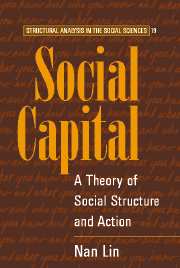Book contents
- Frontmatter
- Contents
- Preface
- Part I Theory and Research
- 1 Theories of Capital
- 2 Social Capital
- 3 Resources, Hierarchy, Networks, and Homophily
- 4 Resources, Motivations, and Interactions
- 5 The Theory and Theoretical Propositions
- 6 Social Capital and Status Attainment
- 7 Inequality in Social Capital
- Part II Conceptual Extensions
- Part III Epilogue
- References
- Index
1 - Theories of Capital
The Historical Foundation
Published online by Cambridge University Press: 05 June 2012
- Frontmatter
- Contents
- Preface
- Part I Theory and Research
- 1 Theories of Capital
- 2 Social Capital
- 3 Resources, Hierarchy, Networks, and Homophily
- 4 Resources, Motivations, and Interactions
- 5 The Theory and Theoretical Propositions
- 6 Social Capital and Status Attainment
- 7 Inequality in Social Capital
- Part II Conceptual Extensions
- Part III Epilogue
- References
- Index
Summary
One of the far-reaching explanatory schemes in contemporary sociology and economics focuses on the concept of capital. What is capital? I define it as investment of resources with expected returns in the marketplace. Capital is resources when these resources are invested and mobilized in pursuit of a profit – as a goal in action. Thus, capital is resources twice processed. In the first process, resources are being produced or altered as investment; in the second, the produced or altered resources are being offered in the marketplace for a profit. In one instance, capital is the outcome of a production process (producing or adding value to a resource); in the other, it is the causal factor in a production (the resource is exchanged to generate a profit). These are processes because both investment and mobilization involve time and effort. In the past two decades, social capital in its various forms and contexts has emerged as one of the most salient forms of capital. While much excitement has been generated, divergent views, perspectives, and expectations have also raised a serious question: is this a fad, or does it have enduring qualities that will herald a new intellectual enterprise?
The purpose of this volume is to present a theory of social capital, a theory eliciting the central theme that capital is captured in social relations and that its capture evokes structural constraints and opportunities as well as actions and choices on the part of the actors.
- Type
- Chapter
- Information
- Social CapitalA Theory of Social Structure and Action, pp. 3 - 18Publisher: Cambridge University PressPrint publication year: 2001
- 268
- Cited by



